How to Start Learning AI as a Complete Beginner in 2025
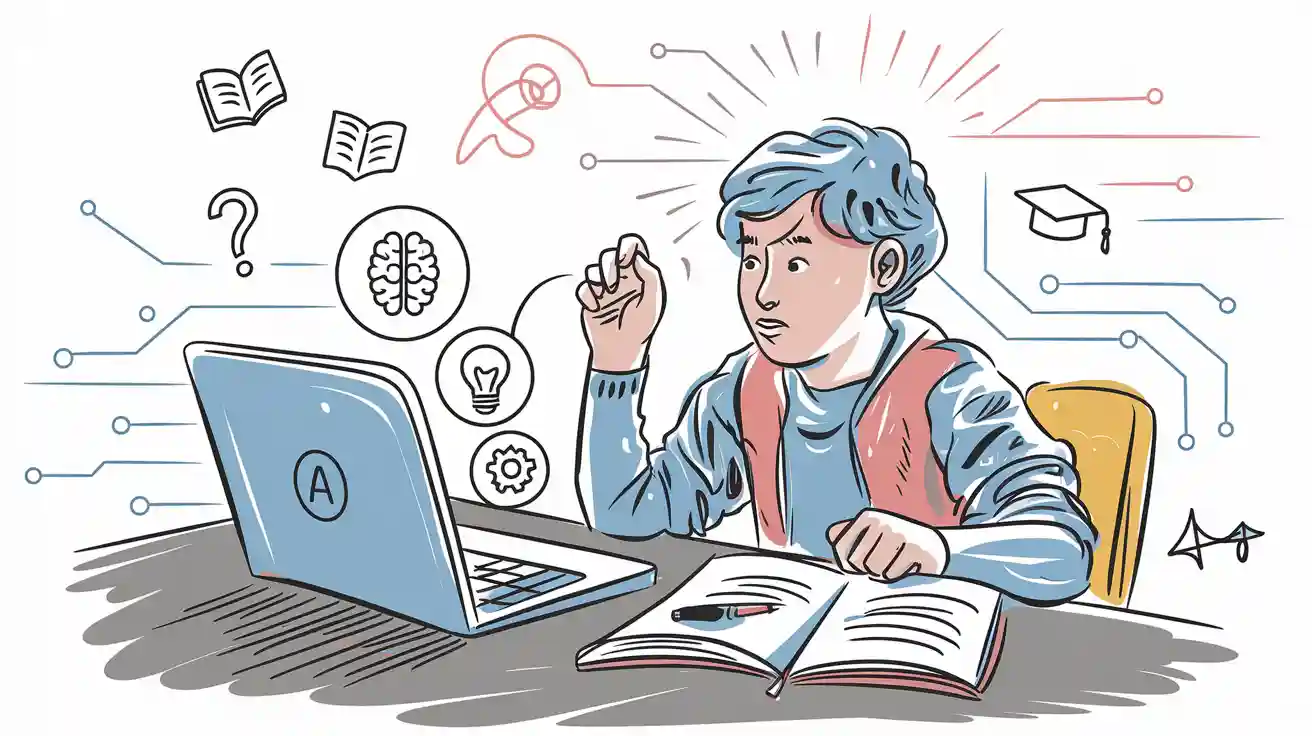
You might wonder how to learn ai as a beginner in 2025. The answer feels simple: start with a clear learning plan and structured courses. You can learn ai from scratch, even if you have no experience. Many young learners already use ai every day.
Most find ai tools effective for learning tasks.
Artificial intelligence helps you save time and makes complex topics easier. Demand for ai skills keeps rising, as shown below:
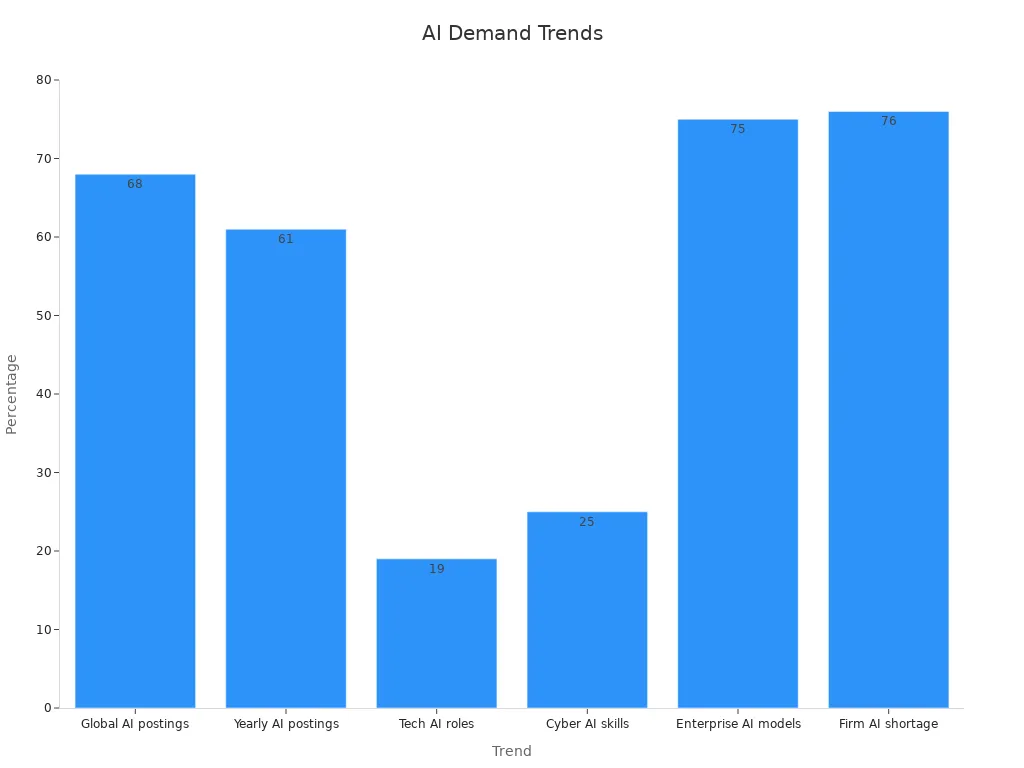
You just need a solid learning plan, the right courses, and a roadmap to guide your ai learning journey.
Key Takeaways
Set clear goals before learning AI to stay focused and choose the right resources.
Start with beginner-friendly online courses and create a personalized learning plan.
Learn Python and basic math like algebra and statistics to build a strong AI foundation.
Practice by building simple AI projects and use tools like Google Colab and Kaggle.
Join AI communities and find mentors to get support, stay motivated, and grow your skills.
How to Learn AI
Set Your Goals
Before you jump into any ai course or resource, you need to know what you want to achieve. Setting clear goals helps you stay focused and makes your ai learning plan more effective. When you know your goals, you can pick the right resources and track your progress.
Tip: Write down your main goal. Do you want to build ai projects, get a job, or just understand how ai works? Your answer will shape your learning plan.
Research shows that clear goals make a big difference. When you set learning goals, ai tools can adjust to your needs. For example, ChatGPT and other ai platforms help you learn at your own pace and style. This makes learning more fun and helps you remember more. Students with clear goals feel more motivated and engaged. In fact, experts say that having clear goals helps you build important skills like curiosity, problem-solving, and leadership.
Here are some ways clear goals help you learn ai better:
You build strong skills like agency and curiosity.
You learn to manage ai projects and communicate well.
You focus on the skills that matter most for your path.
You can use ai for personal growth and future jobs.
You become better at leading and working with ai agents.
When you set your goals, you make your ai learning plan work for you. This is the first step on your path to success.
Choose a Learning Path
Now that you have your goals, you need to choose a path that fits your needs. There are many ways to learn ai, but starting with structured online courses is the best way for most beginners. These courses guide you step by step and give you the basics you need.
Some top online learning platforms for ai include:
Coursera
Udacity
edX
Khan Academy
These platforms offer ai courses for all levels. You can find beginner-friendly resources or advanced topics. Many courses let you learn at your own pace. You can pause, review, and practice as much as you need.
Note: Most ai courses include hands-on projects. This helps you apply what you learn right away.
Creating a personalized learning plan makes your path even stronger. Data from Coursera and CTE Academy shows that students who follow a personalized plan do much better. For example, Coursera students improved their results by 70% when they used a plan made just for them. CTE Academy saw a 30% increase in student engagement and a 25% rise in graduation rates over three years. In one school, 87% of students felt more engaged by the end of the year.
Here’s a table showing how personalized ai learning plans help students:
Metric | Improvement | Example / Source |
|---|---|---|
Academic Performance | Up to 30% better | Squirrel AI in China showed up to 30% improvement in academic results |
Math Scores | 8 percentile points | Carnegie Learning in the U.S. reported 8 percentile point gains in math |
Reading Scores | 9 percentile points | Schools using personalized learning saw 9 percentile point gains in reading |
Student Attendance | 12% increase | Schools implementing personalized learning experienced a 12% rise in attendance |
Dropout Rates | 15% decrease | Dropout rates dropped by 15% in schools using personalized learning |
Student Engagement | 75% motivated students | 75% of students felt more motivated in personalized learning vs 30% in regular classrooms |
Long-term Outcomes | 30% better performance | CTE Academy saw 30% increase in engagement and 25% rise in graduation rates over 3 years |
You can see these improvements in the chart below:
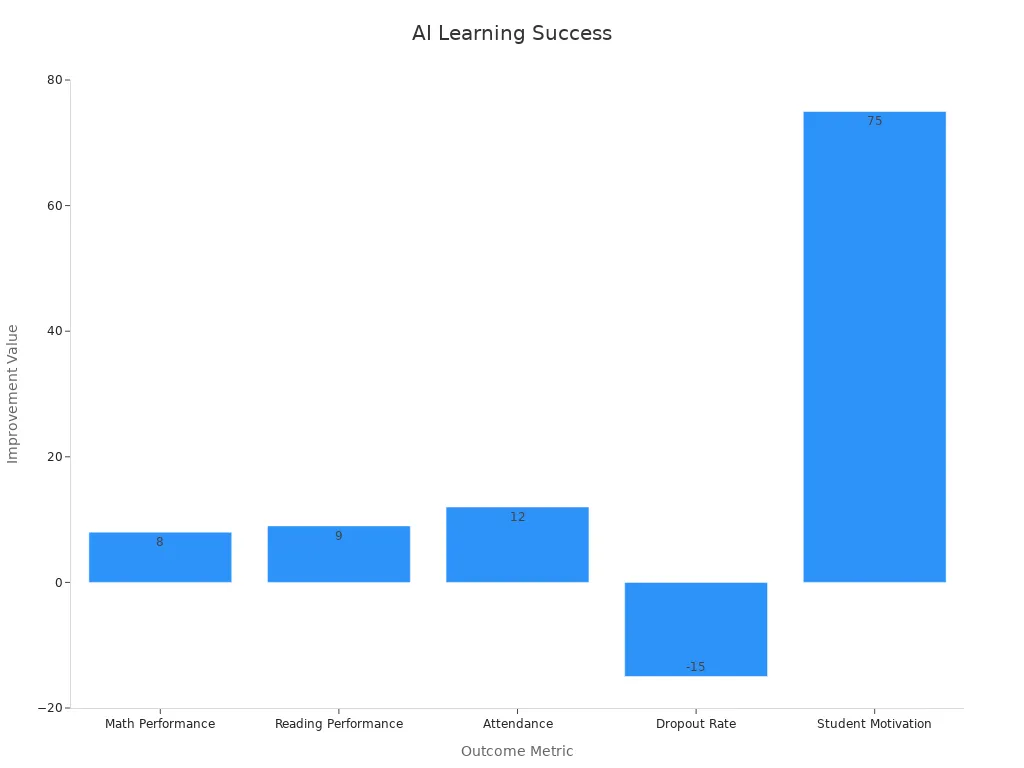
When you follow a clear path and use the right resources, you make your ai learning journey smoother. Here are some steps to help you build your plan:
Pick a starting point. Choose beginner ai courses if you are new.
Make a schedule. Decide how much time you will spend each week.
Use different resources. Try videos, readings, and practice labs.
Track your progress. Check off each step as you finish.
Adjust your plan as you learn. If something is too hard or too easy, change your path.
Tip: Don’t be afraid to try new resources or switch your learning path if you find something that works better for you.
With a strong ai learning plan, you can learn ai step by step. You will find the right resources, stay motivated, and reach your goals faster. Remember, every ai expert started as a beginner. Your path starts with a single step and a good plan.
Artificial Intelligence Basics
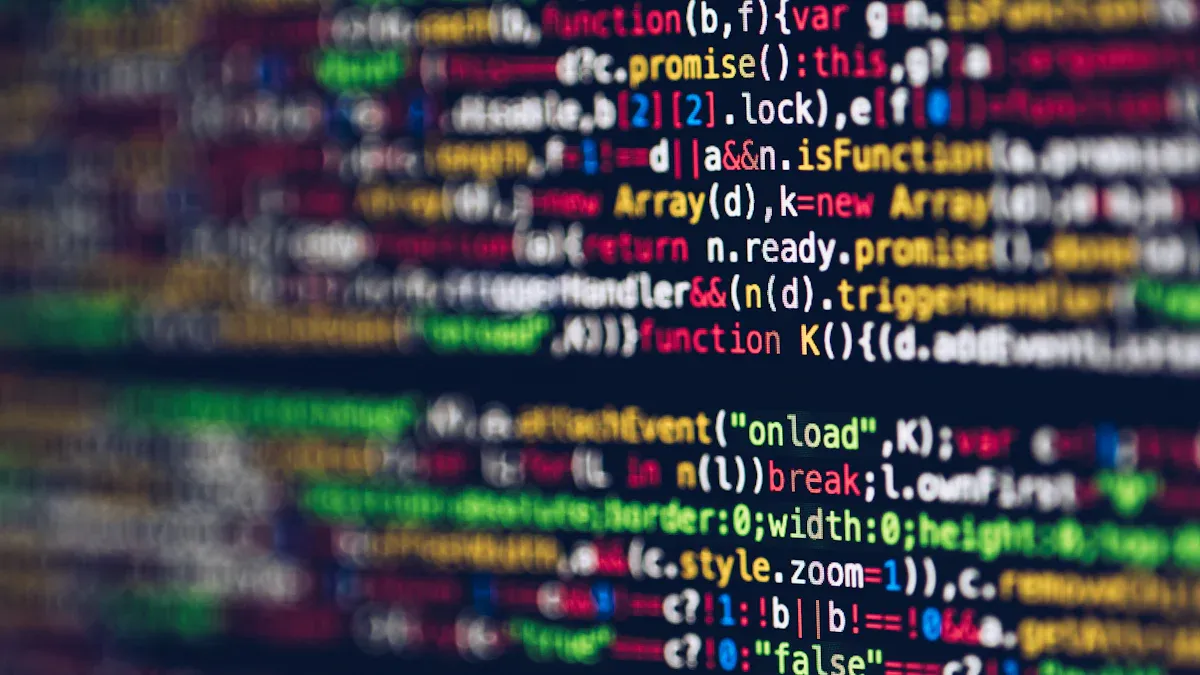
What Is AI
You hear about artificial intelligence everywhere, but what does it really mean? When you learn artificial intelligence, you start by understanding what it is and how it works. Many experts have tried to explain it in simple ways:
Jerry Kaplan says artificial intelligence means making computer programs or machines that can do things people call "intelligent."
Stuart Russell and Peter Norvig talk about four main types: systems that think like humans, think rationally, act like humans, and act rationally.
The European Union splits artificial intelligence into two groups: software AI (like virtual assistants, search engines, and facial recognition) and embedded intelligence (like robots, drones, and smart devices).
The story of artificial intelligence began with Alan Turing’s famous question, “Can machines think?” John McCarthy gave us the name "artificial intelligence" at a big meeting in 1956. Since then, the field has grown fast. You see AI in things like chatbots, self-driving cars, and even games.
Note: Understanding artificial intelligence helps you see how it changes the world around you. You use AI every day, even if you don’t notice it.
Why Learn AI in 2025
You might wonder why learning artificial intelligence matters so much right now. The answer is simple: AI is everywhere, and it keeps growing. If you start learning now, you get ready for the future.
Here’s a table showing how fast the AI world is growing:
Statistic Description | Value/Forecast | Timeframe |
|---|---|---|
AI technology market value | By 2025 | |
Annual growth rate of AI technology | 33.2% | 2020 to 2027 |
AI’s boost to global GDP | 26% ($15.7 trillion) | By 2030 |
Machine learning market size | 2019 to 2027 | |
Executives using machine learning in business | 46% | Recent survey |
When you learn artificial intelligence, you open doors to new jobs and skills. Many companies want people who understand AI. You can use AI to solve problems, make smart choices, and even help others. Understanding artificial intelligence gives you an edge in school, work, and life.
🚀 Start learning now, and you’ll be ready for the amazing changes coming in 2025 and beyond!
Build Your Foundation
Learn Python
If you want to learn ai from scratch, start with Python. Python is the most popular language for ai because it is simple and powerful. You can read and write Python code easily, even if you have never programmed before. Many ai tools and libraries use Python, so you will find lots of resources and support.
Here’s a table showing why Python helps you build ai skills fast:
Success Metric | Description | Impact on AI Development |
|---|---|---|
Extensive Library Ecosystem | Python has libraries like TensorFlow and Scikit-learn for ai and ML tasks. | Lets you build and test ai projects quickly. |
Low Entry Barrier | Python uses easy, English-like words. | You can learn ai from scratch without much stress. |
Growing Demand for Python Programmers | More companies want people with Python and ai skills. | Opens doors to new jobs and learning paths. |
You can try simple Python code, like checking if a number is prime, and see how easy it feels. Many real-world platforms, such as Illumidesk, use Python-based ai to make learning better for everyone. If you want to build ai skills, Python is your best friend.
Math and Statistics
You might wonder why math matters when you learn ai from scratch. Math and statistics help you understand how ai works under the hood. You do not need to be a math genius, but knowing some basics makes learning ai easier.
Teachers often use real-world data, like Titanic survival rates or spam emails, to show how math connects to ai. You will see concepts like probability, regression, and geometry in action. For example, coding games can help you learn how ai predicts outcomes using probability. Professor Lizhen Lin’s research shows that math and statistics help ai find patterns and make smart choices, just like humans do.
Tip: Focus on topics like statistics, probability, and basic algebra. These will help you build strong ai skills and understand ai models better.
Learn AI from Scratch
You can learn ai from scratch, even if you feel nervous at first. Many top schools and programs have proven that starting from zero works. For example, Stanford created an ai program that predicts when students need help, and it works 80% of the time. The University of Murcia used an ai chatbot that answered over 91% of student questions, making learning more fun and personal.
Other schools use ai-powered tutors to boost grades and lower stress. Knewton’s adaptive learning program raised test scores by 62%. Georgia Tech’s ai teaching assistant handled thousands of questions with almost perfect accuracy. These stories show that learning ai from scratch can lead to big improvements in your skills and confidence.
Remember: Foundation models, like large neural networks, are the building blocks for many ai tasks. The U.S. National Science Foundation recommends starting with areas like machine learning, human-ai interaction, and computer vision. These are great places to begin your ai journey.
Core AI Concepts
Machine Learning
When you start learning artificial intelligence, you will hear about machine learning all the time. Machine learning is a part of ai that lets computers learn from data instead of following step-by-step instructions. Arthur Samuel first talked about this idea in the 1950s. Today, machine learning helps computers solve hard problems, like recognizing faces in photos or sorting emails.
You can think of machine learning as the brain of modern ai. It works by finding patterns in data and making predictions. Experts at MIT say you should know the basics, the power, and the limits of machine learning. This helps you use ai safely and understand its impact on society.
Here are the main types of machine learning you will see:
Supervised learning: You train the computer with labeled data, like teaching it to spot spam emails.
Unsupervised learning: The computer finds patterns in data without labels, such as grouping customers by shopping habits.
Reinforcement learning: The computer learns by trying things and getting rewards, like playing a video game.
Deep learning: This uses neural networks to handle complex tasks, such as speech or image recognition.
Machine learning is the core of ai in many fields, from healthcare to farming. It is the main reason ai can do so many smart things today.
Comparative Factor | Machine Learning (ML) Characteristics | Deep Learning (DL) Characteristics |
|---|---|---|
Definition | ML uses statistical models and algorithms to make predictions based on historical data. | DL is a subset of ML that uses artificial neural networks to mimic human brain functions. |
Architecture | Based on traditional statistical models. | Uses multi-layered artificial neural networks. |
Data Needs | Needs smaller datasets and less computing power. | Needs huge datasets and lots of computing power. |
Feature Engineering | Needs experts to pick features. | Learns features from raw data automatically. |
Performance | Good for simple problems. | Best for complex tasks like language and robotics. |
Tip: You can use python to try out machine learning projects. Many online courses teach you how to use python for ai.
Neural Networks
Neural networks are a big part of deep learning and artificial intelligence. They work a bit like your brain, using layers of tiny units called neurons. These networks help ai learn from data, spot patterns, and make decisions on its own.
Researchers at MIT explain that deep learning networks have more layers and can solve harder problems than simple networks. Neural networks power many ai tools you use every day. For example, they help with voice assistants, weather forecasts, and even medical diagnosis.
Here are some ways neural networks help in real life:
In defense, they process radar and sonar data.
In banking, they check if signatures are real.
In robotics, they help robots move and avoid obstacles.
In healthcare, they predict diseases and help doctors make better choices.
Neural networks are at the heart of deep learning. They make ai smarter and more useful in many areas.
Note: You can build simple neural networks with python. Many ai courses show you how to do this step by step.
Algorithms
Algorithms are the step-by-step instructions that drive artificial intelligence. Every ai system uses algorithms to solve problems, make predictions, and learn from data. In healthcare, for example, ai algorithms help doctors diagnose diseases and plan treatments.
You need to know that not all algorithms are perfect. Sometimes, they can be biased if the data used to train them is unfair. For example, one healthcare algorithm underestimated the needs of Black patients because of biased data. That is why experts say you should always check how ai algorithms work and make sure they are fair.
Here are some important points about algorithms in ai:
They help with diagnosis, management, and research in healthcare.
You need to learn the basics of machine learning to understand how algorithms work.
Developers, translators, and users all need to know about ai algorithms to use them safely.
It is important to test and check ai algorithms often to avoid mistakes and bias.
Tip: Learning how to write algorithms in python will boost your ai skills and help you build your own ai projects.
Hands-On Practice
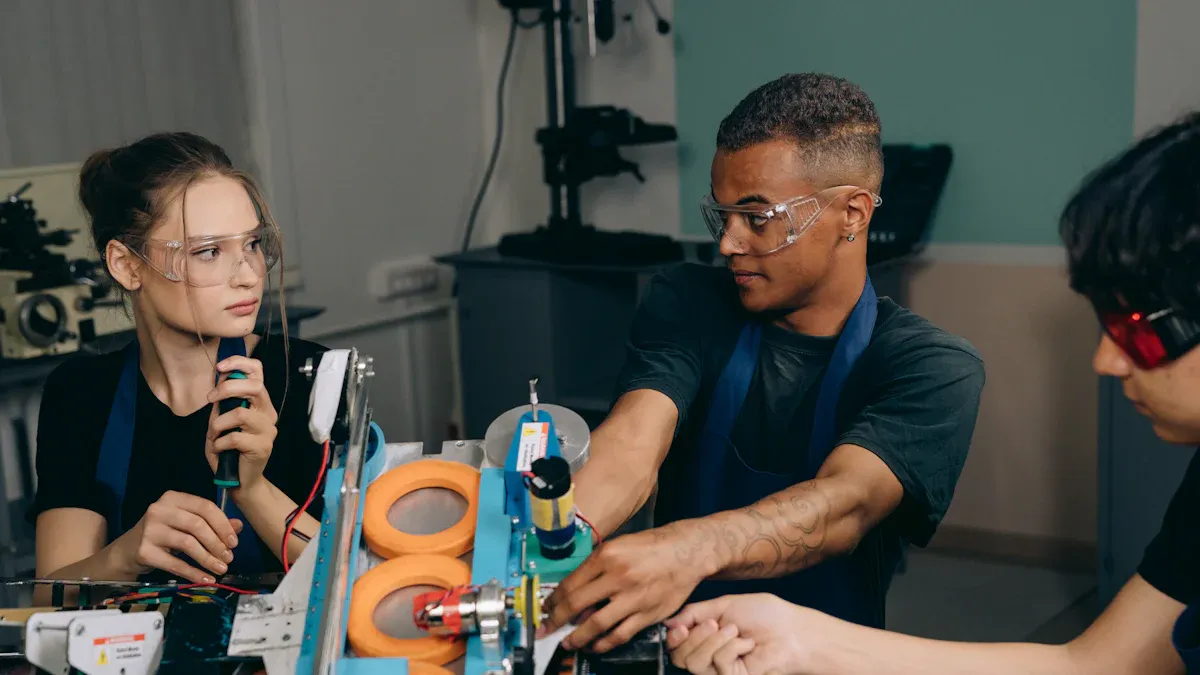
AI Projects
You learn best when you build real things. AI projects help you turn theory into action. Many top programs, like the Professional Certificate Course in Generative AI and Machine Learning by IIT Kanpur, use hands-on projects to teach deep learning and machine learning. You get to work on real problems, use tools like python, and see how ai works in the real world. The AI4Good Lab also gives you a chance to join team projects and mini hackathons. You solve real-world problems and learn from mentors. ProjectPro suggests starting with beginner projects and moving to harder ones as you grow. This step-by-step approach helps you build confidence and show your skills to future employers.
Tip: Start with simple ai projects, like building a chatbot or a basic image classifier using python. These projects help you understand deep learning and machine learning concepts.
Use AI Tools
You need the right resources to practice ai. Google Colab and Kaggle are two of the best platforms for hands-on projects. Google Colab lets you run python code in the cloud, use powerful GPUs, and even work with deep learning models. You get up to 12 hours per session and can use tools like TensorFlow and Keras. Kaggle offers free GPU hours, python and R support, and a huge community. You can join competitions, share notebooks, and learn from others. Both platforms make ai learning fun and social. You can even work with friends in real time, just like using Google Docs.
Feature/Metric | Google Colab (A100 GPU) | Kaggle (P100 GPU) |
|---|---|---|
Session Duration | 6-9 hours (free) | |
Free GPU Hours | Not guaranteed | 30 per week |
Community Features | Collaboration | Competitions, forums |
Practice Labs
Practice labs give you a safe space to try new ai skills. Many industry trainers, like myTectra, use interactive labs and ai sandboxes. You get to solve real business problems and get feedback from experts. AI-driven simulation labs, like those used in medical training, let you practice with real-world scenarios. These labs help you think critically and apply deep learning and python skills. You get instant feedback, so you know what you need to improve. Hands-on labs also help you remember what you learn and close skill gaps faster.
Practice labs use real-world cases to boost your ai skills.
You get feedback and can track your progress.
Labs help you master deep learning and python by doing, not just reading.
Remember: The more you practice, the better you get at ai. Use all the resources you can find and keep building hands-on projects.
AI Tools and Libraries
Common AI Tools and Libraries
You need the right tools to work with artificial intelligence. Many students and teachers use ai tools every day. As of late 2023, almost half of college students and about 22% of teachers use ai for writing, tutoring, and even grading. You see ai in many places, from classrooms to libraries. School leaders say ai saves time and helps with lesson planning. Some tools even help students with learning differences, like dyslexia.
Here are some popular ai tools and libraries you might use:
ChatGPT: Great for writing help and answering questions.
Khanmigo: An ai tutor from Khan Academy.
Gradescope: Helps teachers grade homework faster.
Duolingo Max: Uses ai to make language learning fun.
Microsoft Immersive Reader: Supports students who need extra reading help.
You will also use libraries like TensorFlow, PyTorch, and Scikit-learn. These work with python and make deep learning and machine learning easier. Many schools use ai for personalized learning and to make lessons more interesting. The use of ai in education is growing fast, with a 16.3% yearly growth rate. You can see how important artificial intelligence has become in your daily life.
Tip: Start with python libraries like Scikit-learn if you are new. Move to TensorFlow or PyTorch when you want to try deep learning.
Build Your Own AI Tools
You can build your own ai tools to solve real problems. When you create custom artificial intelligence tools, you learn how ai works from the inside. For example, researchers use ai co-pilots like quinn to design surveys, analyze data, and write reports. These tools let you change questions and see how ai responds. You get to control the output and learn more about data and patterns.
Custom ai tools help you work faster and make better choices. Platforms like Qualtrics and Medallia use artificial intelligence to study how people feel and what they want. They use deep learning to find hidden trends in feedback. You can use python to build simple ai tools for your own projects. This hands-on practice helps you understand ai and deep learning better.
Momen
Momen is a no-code platform that helps beginners go beyond theory and actually build real AI tools—fast. Whether you're experimenting with ChatGPT workflows, building RAG-based assistants, or integrating APIs, Momen lets you do it all visually—no coding required.
Perfect for learners, creators, and curious minds, Momen turns AI practice into real product-building. Learn by doing, and launch something useful while you're at it.
Note: When you build your own ai tools, you learn by doing. You also get to solve problems that matter to you.
Join the AI Community
Online Forums
You do not have to learn ai alone. When you join an ai community, you connect with people who share your interests. Online forums give you a place to ask questions, share ideas, and get help from others. You can find answers fast and see how others solve problems. Many beginners say that joining an ai community makes learning easier and more fun.
Here are some ways ai improves your experience in online forums:
You get personalized updates and messages based on your interests.
Ai tools help analyze big data from posts and comments, so you see trends and popular topics.
Forums use ai to listen to social media and respond quickly to new ideas.
Ai keeps the community safe by flagging bad content.
Tools like ChatGPT help create helpful posts and answers.
Chatbots give you real-time support, so you never feel stuck.
Ai predicts what topics will be important next, so you stay ahead.
Language translation tools help everyone join, no matter where they live.
Ai records and transcribes virtual meetings, so you can focus on learning.
Forums use ai to find new members who will add value to the community.
Ai also makes forums more engaging and safe. For example, Social Pinpoint’s Analysis Assistant finds patterns in posts quickly. Anti-SPAM systems keep the space friendly. Chatbots answer questions any time, day or night. You get a better, more welcoming ai community because of these tools.
Tip: Try joining forums like Reddit’s r/MachineLearning, Stack Overflow, or AI Alignment Forum. You will meet people who want to help you grow.
Find a Mentor
A mentor can make your ai journey smoother. When you join an ai community, you often find experienced members who want to guide beginners. A mentor gives you advice, shares resources, and helps you avoid common mistakes. You learn faster and feel more confident with someone cheering you on.
Check out these real results from mentorship programs:
Statistic / Case Study | Description | Impact on AI Mentorship Effectiveness |
|---|---|---|
Organizations with mentorship see a 35% boost in skill acquisition. | Mentorship helps you build ai skills faster. | |
85% User Empowerment | 85% of users feel more empowered with tailored mentor matches. | Personalized guidance makes ai learning journeys better. |
IBM Mentee Satisfaction Increase | IBM’s mentorship model led to a 50% rise in mentee satisfaction. | Mentees enjoy the ai community more with good mentors. |
IBM Employee Retention Improvement | IBM’s program improved retention by 36%. | Mentorship keeps you engaged in the ai community. |
Accenture Career Advancement | 75% of employees saw better career growth with ai-driven mentorship. | Mentorship opens doors in ai careers. |
20% Productivity Increase | Tech mentorship boosts productivity by up to 20%. | You get more done with a mentor’s support. |
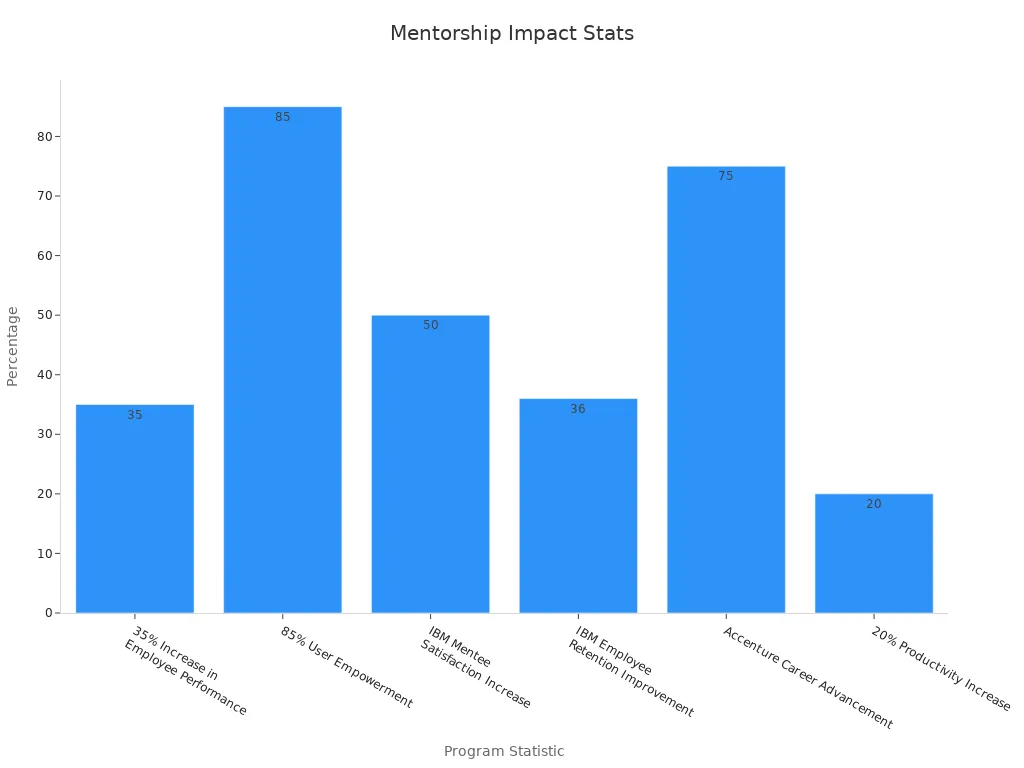
You get the best results when ai tools support, but do not replace, human mentors. Ai can help match you with the right mentor and suggest resources. Only a real person can give you empathy and understand your unique story. When you join an ai community, look for mentorship programs or ask experienced members for help. You will grow faster and feel part of something bigger.
Grow Your AI Career
Certifications
If you want to boost your ai career, getting a certification can help you stand out. Many employers look for people with strong ai certification. These programs show that you have real skills in artificial intelligence. You can pick from many options, like Google, AWS, or Stanford. Each ai certification has its own focus, but all of them help you prove your knowledge.
Here’s a table that shows how different certification programs can help your career:
Certification Program | Success Metrics & Career Outcomes |
|---|---|
Stanford AI Graduate Certificate | 300+ graduates became technical leaders, faster promotions, salary increases of $50K-$70K |
Google Professional Machine Learning Engineer | Career jumps from $95K to $180K+, real-world case: $85K to $140K in 8 months |
AWS Certified Machine Learning Specialty | Entry salaries $110K-$135K, senior roles up to $220K+, focus on cloud ML skills |
General AI Certification Outcomes | 85%+ job placement in 18 months, salary increases of $25K-$70K, 40-60% salary growth in 18 months |
Market Outlook & Demand | 26% job growth for AI roles through 2033, certified pros get hired faster and earn more |
You can see that ai certification leads to better jobs, higher pay, and faster career growth. Most programs take a few months to a year, but the results last much longer.
Tip: Choose an ai certification that matches your career goals and interests in artificial intelligence.
Build a Portfolio
A strong portfolio helps you show what you can do with ai. You can include projects, code samples, and even short videos. Companies want to see how you use artificial intelligence to solve real problems. Start with simple projects, then add more advanced work as you learn.
Many top companies, like General Atlantic, help their teams grow by building portfolios. They focus on data skills, teamwork, and using ai to improve business results. You can follow this idea by working on projects that match your career goals. Try to solve real problems, like making a chatbot or using ai to study data. Show how your work helps others or makes things better.
Show your best ai projects in your portfolio. This helps employers see your skills and your passion for artificial intelligence.
Interview Prep
Getting ready for an ai job interview can feel scary, but you can do it! Practice common questions about artificial intelligence and ai tools. Review your portfolio and be ready to talk about your projects. Employers want to know how you solve problems and work with others.
Here are some ways to prepare for your ai career interview:
Practice explaining your ai projects in simple words.
Review key terms from your ai certification.
Do mock interviews with friends or mentors.
Stay calm and show your excitement for artificial intelligence.
Remember: Every interview is a chance to learn and grow in your ai career. Keep practicing and you will get better each time.
Stay Motivated
Overcome Challenges
Learning ai can feel tough sometimes. You might get stuck on a hard topic or feel lost in a sea of new words. That is normal. Every beginner faces challenges when starting with ai. The key is to keep going and not give up.
Here are some ways you can overcome common ai challenges:
Break big problems into small steps. If you do not understand a concept, look for a simple example or ask for help.
Ask questions in forums or ai communities. Someone else has probably faced the same problem.
Take breaks when you feel frustrated. A short walk or a snack can help you clear your mind.
Celebrate small wins. Did you finish your first ai project? That is a big deal! Give yourself credit.
Remember: Every expert in ai started as a beginner. Mistakes help you learn. You will get better with practice.
Track Progress
You need to see how far you have come in your ai journey. Tracking your progress keeps you motivated and helps you spot areas where you need more practice. You can use a notebook, an app, or even a simple table.
Here is a sample table you can use to track your ai learning:
Date | Topic Learned | Project Completed | What I Found Hard | Next Step |
|---|---|---|---|---|
2025-01-10 | Python Basics | Hello World App | Loops | Practice Loops |
2025-01-17 | Machine Learning | Spam Classifier | Data Cleaning | Review Data Prep |
Set weekly goals for your ai learning.
Check off each topic or project as you finish.
Review your notes to see your growth.
Tip: Share your progress with friends or mentors. They can cheer you on and help you stay excited about ai.
You will face ups and downs, but if you keep moving forward, you will master ai step by step.
You can learn ai as a beginner in 2025 by following a clear plan. Start with structured courses and dive into hands-on projects. Use artificial intelligence tools every day. Stay active in the ai community and share your progress. Your ai learning journey will help you build real skills for your future career. Artificial intelligence keeps changing the world. Take the first step on your ai learning journey today. 🚀
FAQ
How long does it take to learn AI from scratch?
It depends on your pace. Most beginners need 3 to 6 months to learn the basics if they study a few hours each week. You can go faster or slower. The key is to stay consistent.
Do I need a strong math background to start learning AI?
You do not need to be a math expert. Basic algebra, probability, and statistics help a lot. You can pick up more math as you go. Many courses explain math in simple ways.
What is the best programming language for AI beginners?
Python is the best choice for beginners. It is easy to read and has many AI libraries. You will find lots of tutorials and support online. Start with Python, and you will build skills quickly.
Can I learn AI without a computer science degree?
Yes, you can! Many people learn AI through online courses, projects, and practice. You just need curiosity and a willingness to learn. A degree helps, but it is not required.
How do I stay motivated while learning AI?
Try these tips:
Set small, clear goals.
Celebrate your progress.
Join online AI communities.
Work on fun projects. You will stay excited and keep moving forward!
See Also
Explore Ways To Profit From Artificial Intelligence In 2025
A Simple Introduction To AI Agents For Newcomers
Create An AI Dietitian Easily Using DeepSeek Without Coding

